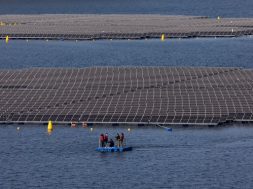
India is battling with a two-pronged problem of environment as well as energy crisis.Together with its prolonged struggle to remove the evils of inequality, poverty and improvement of the human development indicators, a constant degradation of environment and ecological destruction has become a runaway problem, leaving a large section of the population in the country as energy poor.According to a study conducted by the Centre for Science and Environment (CSE) New Delhi, about 300 million people have no access to electricity. And the biggest challenge before the nation is to figure out sustainable ways to meet its energy requirements without compromising the ecological balance and the looming danger of climate change.
Experts from the field of renewable energy are of the view that the current energy policy of 2006 is primarily focused on developing fossil fuel resources for electricity and direct use of oil and gas for transport, industrial usage and cooking. Advocates of change argue that mere shift to renewable electricity will be insufficient. There is a larger need to adopt a renewable electricity future that is affordable and accessible to all.
The research carried out by the CSE in 2013-14, the average per capita per annum consumption of electricity was only 957 units which has been estimated to have increased to 1,010 units a year. According to the Ministry of Power, out of a total of 5, 97,464 villages in India, 5,79, 209 villages have been electrified as on June 12, 2016. It has been a traditional custom to depend on the grid expansion as a means to achieve high electrification rates in a country like India. But the practice has faced a challenge and has largely failed to provide proper supply of electricity to the poor for a plethora of reasons, most prominent being willingness of the distribution companies to supply power and political interference.
Speaking about solar power and policy development in the North East at the two-day meet on 100 per cent Renewable Energy Future for North East organised by the CSE at Guwahati recently, Rakesh Kumar, Director of Solar Energy Corporation of India (SECI) said that the overall target for solar power in North East is estimated to be 1241 MW of which Assam has a target of 663 MW. Emphasising on the importance of solar power in the North East, Kumar highlighted upon the fact that against an annual requirement of 14,488 MU of energy the region has an availability of 13,735 MU of energy registering energy deficit of 753 MU in 2015-16 together with a peak deficit of 206 MW during same period. He underscored that fact that there is a great need to set up a 500 MW solar PV project in North East which can wipe out the total energy deficit in the region. He informed that schemes for developing a host of solar parks across North East have been designed. There is a four-point mechanism for development of solar parks which the State government can adopt – the government can develop solar park using its own agency, it can go for a Joint Venture with SECI or assign SECI for the task. Also the government can give the responsibility to any private partner for establishing the solar park, Kumar said. “For Assam, a 60 MW project is being discussed between the Government and SECI at a conference on Make in India, Make in North East held in Mumbai. The Chief Secretary of Assam has also expressed great interest in the project likely to be set up in the char lands in upper Assam,” Kumar maintained.
Dr Arup Kumar Mishra, Director Assam Energy Development Agency (AEDA) and Assam Science Technology and Environment Council who attended the release of the book MINI GRIDS-electricity for all, complied by the CSE said “Assam has phenomenal possibility for development of energy but we are taking the first step slowly. We must be critical and not cynical in our approach.”
Chandra Bhushan, Deputy Director General of CSE said “in the present phase of energy crisis in the country, efforts must be made to come up with a futuristic and democratic energy model which is decentralised distributed and renewable.” He also spoke about mini grids which will be the energy future not only in North East but across India and also around the world.













